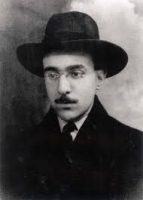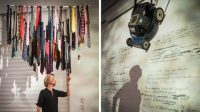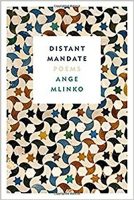July 13, 2017
Edited by David Sanders
Specimen Days
1793 —John Clare, Northamptonshire peasant poet (Shepard's Calendar), is born.
1888 —Fernando A N de Seabra Pessoa, Portuguese poet (Mensagem), is born.
1889 —Robert Hamerling, Austrian poet (b. 1830), dies.

Once they called me a materialist poet
And I admired myself because I never thought
That I might be called by any name at all.
I am not even a poet: I see.
If what I write has any value, it is not I who am
valuable.
The value is there, in my verses.
All this has nothing whatever to do with any will
of mine.
— from “Discontinuous Poems” by Fernando Pessoa
[trans. Eduoard Roditi]
“I am not even a poet: I see. / If what I write has any value, it is not I who am valuable.” – Fernando Pessoa
World Poetry
Philip Larkin: Examining a Life in Tea Towels, Poetry and Pornography

Unseen letters, an extensive collection of tea towels and a pair of knickers bearing the words "do not spank" are going on show in an exhibition of items belonging to poet Philip Larkin. Books, LPs and ties are among the other possessions that are being put on display at the University of Hull. Larkin worked in the university library for 30 years until his death in 1985. Curator Anna Farthing said: "We've tried to piece together a life from objects rather than from words."
Life Ban on Poet Who Ridiculed Pushtuns
Minister of State for Information, Broadcasting and National Heritage, Marriyum Aurangzeb has taken serious notice of a programme aired by PTV in which a poet ridiculed and stigmatised the Pushtun community, and has imposed a life time ban on the participation of the concerned poet in any programme of the official channel.
Irina Ratushinskaya Obituary

Russian poet and dissident who was sentenced to seven years in a labour camp by the Soviet authorities and found refuge in the UK in the 1980s
Early on the morning of 10 October 1986, Igor Gerashchenko, the husband of the dissident Soviet poet Irina Ratushinskaya, phoned Keston College, the centre for the study of religion in communist countries then based at Keston, in Kent. “Irina is free,” he told us: relayed to the BBC and thence to the world, this news upstaged the event for which the media had been waiting – the opening of the Reykjavik summit between the US president Ronald Reagan and the Soviet leader Mikhail Gorbachev.
A collection of tea towels and knickers bearing the words “do not spank” are part an exhibition of items belonging to Philip Larkin.
Recent Reviews
'Thousand Star Hotel: Poems,' by Bao Phi
by Elizabeth Hoover

Minnesotan Bao Phi opens his propulsive second collection with a primer on the Vietnamese word “ma,” which means different things depending on the speaker’s tone. He writes, “Vietnamese people have always been spoken word poets.” As a champion slam poet, Phi modulates his voice to evoke humor, rage and grief. On the page, none of that is lost.
Will You Walk a Little Faster? by Penelope Shuttle Review – an Ode to London
by Kate Kellaway
Penelope Shuttle need not walk any faster – as this, her 14th collection, demonstrates. It is the gentle pace that captivates in her poems. And what a phenomenal poet she is (she has recently celebrated her 70th birthday). She has an unbossy, contemplative, unmistakable voice. She leads you quietly and helps you see things – London especially – afresh. There is nothing stale about the way she writes, although she is thinking about what it means to be older. She reflects on the city, its present moment and history – its bones. The past is there, almost palpable, and the dead, too – only just beyond touch and sight.
Review: Kevin Connolly's Xiphoid Process, Linda Besner's Feel Happier in Nine Seconds and Gary Barwin's No TV for Woodpeckers
by Derek Webster
How do we relate to ourselves and our cultural past? What role do language and the senses play in our experience of the world? Inquiring minds want to know! Three new books by mid-career and veteran authors – let’s call them the Crazy Canucks of poetry – employ zany language, humour and pathos to open up and examine these philosophical questions.
As a champion slam poet, Bao Phi modulates his voice to evoke humor, rage and grief.
Broadsides
Czeslaw Milosz’s Invincible Reason
The author of 'The Captive Mind' became a political thinker who didn’t like politics.
by Edward Hirsch
“What occurred in Poland was an encounter of a European poet with the hell of the twentieth century, not hell’s first circle, but a much deeper one,” the Polish writer Czeslaw Milosz declared in his 1983 collection of lectures, The Witness of Poetry. “This situation is something of a laboratory, in other words: It allows us to examine what happens to modern poetry in certain historical conditions.” What Milosz meant by “historical conditions” was the complete disintegration of European culture—“the sudden crumbling of all current notions and criteria”—between 1939 and 1945. Like other Polish poets, Milosz felt the need to respond in a radical way to the disgrace of Europe—its sinking into inhumanity, its complicity in genocide—by trying to remake poetry from the ground up. It was starting over again after what seemed like the end of the world.
The Seven Stages of Love, According to French Poetry
Love, of course, is a fantasy. And the French in particular make a point of maintaining and analyzing this fantasy, from Abbé Prévost’s eighteenth-century novel of love-drunk obsession to Amélie’s quirky quest for romance, from kissing with tongue to Roland Barthes’ structuralist critique of the language of love.
Understanding Poetry Is More Straightforward Than You Think
by Matthew Zapruder
Do you remember, as I do, how in the classroom poems were so often taught as if they were riddles? What is the poet really trying to say here? What is the theme or message of this poem? What does this word “purple” or “flower” or “grass” really mean? Like classical music, poetry has an unfortunate reputation for requiring special training and education to appreciate, which takes readers away from its true strangeness, and makes most of us feel as if we haven’t studied enough to read it.
“Do you remember, as I do, how in the classroom poems were so often taught as if they were riddles?” – Matthew Zapruder
Drafts & Fragments
Reading a New Poem, Chance the Rapper Chokes Up on NPR
by Emily Mae Czachor
NPR's Tiny Desk concert series is beloved for giving superstar musicians an intimate setting to translate their songs into rather bare-bones live performances. But when Chance the Rapper showed up to perform, he took "stripped down" one step further. In the latest Tiny Desk iteration, which NPR released Wednesday morning, the Chicago-bred rapper delivered a particularly heartrending set amid the Technicolor bookshelves of the NPR music office.
A Harvard Poet Who Came Out as Trans Shows What Patient Tolerance Looks Like
Mark Oppenheimer
“Hi everyone!” wrote the poet and Harvard English professor Steph Burt on her Facebook page two weeks ago. “As many of you know, but some of you don’t, after several years of presenting myself as a lady some of the time, and as a guy at other times, I am now a lady all the time.”
An 8-Hour Marathon Reading of 500 Emily Dickinson Poems
It’s unlikely that reclusive poet Emily Dickinson would have wanted much fuss made over her birthday while still alive to celebrate it. But with the lady safely ensconced in Amherst’s West Cemetery’s plot 53 for more than a century, fans can observe the day in the manner they see fit.
An 8-hour marathon reading of 500 Emily Dickinson poems went down on the poet’s birthday.
Poetry In the News
Neural Network Poetry Is So Bad We Think It’s Written by Humans
Can a machine incapable of experiencing emotion write poetry that stirs the soul? A neural network trained on thousands of lines of poetry has tried its hand at penning its own rhymes that mimic certain forms of verse. Its best efforts even fool people into thinking they’re reading the words of a human poet, rather than the algorithmic output of a cold-hearted AI. The poetic bot is fully tunable, says Jack Hopkins, who developed the system while he was a researcher at the University of Cambridge. It can be programmed to write in a particular rhythm or pen poems on specific themes.
UNLV Professor Taking New US Export to Cuba: Poetry
While American exports to Cuba are a mere trickle, a UNLV professor is about to bring to a new product of immeasurable value to the Caribbean island nation: poetry. Claudia Keelan, who has taught English at the university since 1996, is part of the first delegation of American poets to attend the Havana International Literary Festival. “We were invited as Americans, and that has never happened,” Keelan said. “We want to go there and wage peace and show the good face of America.”
A neural network trained on thousands of lines of poetry has tried its hand at penning its own rhymes that mimic certain forms of verse.
New Books
Equipment for Living: On Poetry and Pop Music by Michael Robbins
[Hardcover] Simon & Schuster, 224 pp., $24.00

Brilliant, illuminating criticism from a superstar poet—a refreshing, insightful look at how works of art, specifically poetry and popular music, can serve as essential tools for living. How can art help us make sense—or nonsense—of the world? If wrong life cannot be lived rightly, as Theodor Adorno had it, what weapons and strategies for living wrongly can art provide? With the same intelligence that animates his poetry, Michael Robbins addresses this weighty question while contemplating the idea of how strange it is that we need art at all.
Lessons on Expulsion: Poems by Erika L. Sánchez
[Paperback] Graywolf Press, 96 pp., $16.00
“What is life but a cross / over rotten water?” Poet, novelist, and essayist Erika L. Sánchez’s powerful debut poetry collection explores what it means to live on both sides of the border―the border between countries, languages, despair and possibility, and the living and the dead. Sánchez tells her own story as the daughter of undocumented Mexican immigrants and as part of a family steeped in faith, work, grief, and expectations. The poems confront sex, shame, race, and an America roiling with xenophobia, violence, and laws of suspicion and suppression.
Set Thy Love in Order: New & Selected Poems by Stephen Romer
[Paperback] Carcanet Press,168 pp., $16.95

Set Thy Love in Order: New & Selected Poems gathers the work of some thirty years, taken from Stephen Romer’s four previous collections, along with a substantial selection of new poems. Stephen Romer has been described as ‘one of our finest poets of thwarted or impossible love’ (Adam Thorpe in the Guardian) and the title of this New & Selected is a Dantescan objurgation as old as the Trecento: Ordina qu’est amore, o tu che m’ami – set thy love in order, o thou who lovest me.
Square Inch Hours: Poems by Sherod Santos
[Hardcover] W. W. Norton & Company, 80 pp., $26.95
In the manner of a poetic meditation, Square Inch Hours draws on elements from fiction, memoir, daybook, and reverie, piecing together moments that follow in the aftermath of a breakdown. Writing from an area outside psychology or personal history, the intensely solitary speaker relates the experience of reengaging with the world. With an adamant attentiveness, he turns his focus to observing reality in its minutest particulars: the expression on the face of a random passerby; the palsied hand of a grocery clerk; copulating flies on a windowsill; a deep gouge, like a bullet hole, in his apartment door. How he perceives is how he reconnects.
Distant Mandate: Poems by Ange Mlinko
[Hardcover] Farrar, Straus and Giroux, 112 pp., $23.00

In Distant Mandate, Ange Mlinko moves between the tormented southern landscape, with its alternately arid and flooded scrublands, and the imaginative landscapes of Western art. Guided by her spiritual forbears―Orpheus, Mallarmé, Pound, Yeats, and others―Mlinko deftly places herself within the tradition of the poet in protest against the obduracy of the real.
If wrong life cannot be lived rightly, as Theodor Adorno had it, what weapons and strategies for living wrongly can art provide?
Correspondences
Former US Poet Laureate Reflects on his Writing and the Iowa Writers’ Workshop
by Cristobal McKinney

When former U.S. Poet Laureate Juan Felipe Herrera arrived at the Iowa Writers’ Workshop in 1988, he was in his early 40s and had been writing poetry seriously since he was 16. He came with two children in tow and rented a house near Burlington and Johnson streets in Iowa City. To help pay the bills, Herrera pawned his guitar, which one of his instructors—the noted poet Marvin Bell—later helped him recover.
Arohanui: James Galvin
by Shaun Miller

Author of eight books of poetry, one book of prose, and one novel, James Galvin is often considered one of the great writers of the American West. Through his portrayal of the natural landscapes and agricultural lives of the Wyoming-Colorado border region, his poetry offers the bitterly hard-won insights that can result from the toughness and vulnerability of such austere ways of living. No one writes better about the Front Range.
When former U.S. Poet Laureate Juan Felipe Herrera arrived at the Iowa Writers’ Workshop in 1988 he pawned his guitar.
Envoi: Editor’s Notes
Titles
It's funny how rhythms and syntactical patterns get stuck in your head. That's why commercial jingles and pop songs are so effective and infectious. When I read the headline about Chance the Rapper ("Reading a New Poem, Chance the Rapper Chokes Up on NPR") it triggered a syntactical memory for me of the titles of many a poem by two of my teachers: Miller Williams and Jim Whitehead. The titles they concocted were often used as a way to enter directly into a poem with the dramatic situation already established by the exposition in the title.
Here are a few such titles:
"In Nashville, Standing in the Wooden Circle Sawed Out from the Old Ryman Stage, the Picker Has a Vision"
"On a Trailways Bus a Man Who Holds His Head Strangely Speaks to the Seat Beside Him"
"At the Roadhouse He Turns to His Wife with an Observation on Morality, Then Asks Her to Dance"
The first two are by Williams and the last by Whitehead. The narrative thread in such titles is strong, leaving the way for the lyric moment to emerge whole. Although sometimes the actual syntactical pattern varied, the premise and the purpose was the same. Setting up the poem in these cases is little different from setting up a joke.
My favorite example of this is a couplet that is barely longer than the title for it, written by Miller Williams:
“My Wife Reads the Paper at Breakfast on the Birthday of the Scottish Poet”
Poet Burns to Be Honored, the headline read.
She put it down. “They found you out,” she said.
An NPR headline about Chance the Rapper triggered a musing regarding titles from our PNIR editor, David Sanders